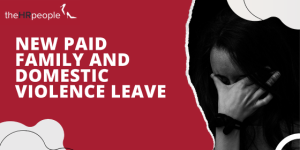Employees will soon be able to access 10 days of paid family and domestic violence leave in a 12-month period.
All employees in the Fair Work system (including part-time and casual employees) will be entitled to 10 days of paid family and domestic violence leave in a 12-month period. This new entitlement will replace the existing entitlement to 5 days of unpaid family and domestic violence leave under the National Employment Standards.
Employees will be entitled to the full 10 days upfront, meaning they won’t have to accumulate it over time. The leave won’t accumulate from year to year if it isn’t used.
The new leave entitlement will be available from:
-
- 1 February 2023, for employees of non-small business employers
- 1 August 2023, for employees of small business employers.
Employees can still access 5 days of unpaid family and domestic violence leave until the new paid leave entitlement becomes available to them.
Full-time, part-time and casual employees will be able to access 10 days of paid family and domestic violence leave in a 12-month period. It won’t be pro-rated for part-time or casual employees.
The full 10-day leave entitlement will be available upfront. It won’t accumulate from year to year if it’s not used.
The new leave provisions will be independently reviewed after 12 months to consider the impacts on small businesses, sole traders and people experiencing family and domestic violence.
Employees will continue to be entitled to 5 days of unpaid family and domestic violence leave until they can access the new paid entitlement.
If an employee takes paid family and domestic violence leave, they have to let their employer know as soon as possible. This could be after the leave has started. An employer can ask their employee for evidence to show that the employee needs to do something to deal with family and domestic violence and it’s not practical to do that outside their hours of work.
An employer can only use this information to satisfy themselves that the employee is entitled to family and domestic violence leave, unless:
- the employee consents
- the employer is required to deal with the information by law, or
- it’s necessary to protect the life, health or safety of the employee or another person.
The employer can’t use the information for other purposes, including to take adverse action against the employee.
All other rules about notice and evidence are the same as the current rules for taking unpaid family and domestic violence leave.
For more information please contact us today.
Karen Vercoe B.Com,
Director of The HR People
M: 0408 008 678
E: kvercoe@thehrpeople.com.au
W: www.thehrpeople.com.au






